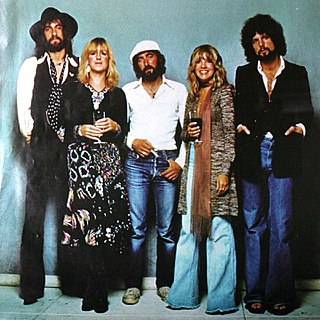
Fleetwood Mac are a British-American rock band formed in London in 1967. Fleetwood Mac was founded by guitarists and vocalists Peter Green and Jeremy Spencer and drummer Mick Fleetwood. Bob Brunning was hired as a temporary bass guitarist before John McVie joined the line-up in time for their eponymous debut album. Danny Kirwan joined as a third guitarist and vocalist in 1968. Keyboardist and vocalist Christine Perfect, who contributed as a session musician starting with the band's second album, married McVie and joined Fleetwood Mac as a full member in 1970, becoming known as Christine McVie.

Michael John Kells Fleetwood is a British musician, songwriter and actor. He is the drummer, co-founder, and leader of the rock band Fleetwood Mac. Fleetwood, whose surname was merged with that of the group's bassist John "Mac" McVie to form the name of the band, was inducted into the Rock and Roll Hall of Fame with Fleetwood Mac in 1998.

Robert Lawrence Welch Jr. was an American musician who was a member of Fleetwood Mac from 1971 to 1974. He had a successful solo career in the late 1970s. His singles included "Hot Love, Cold World", "Ebony Eyes", "Precious Love", "Hypnotized", and his signature song, "Sentimental Lady".
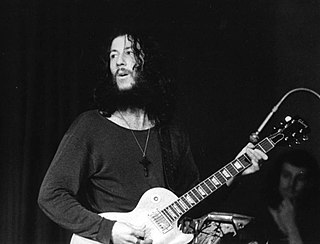
Peter Allen Greenbaum, known professionally as Peter Green, was an English blues rock singer-songwriter and guitarist. As the founder of Fleetwood Mac, he was inducted into the Rock and Roll Hall of Fame in 1998. Green founded Fleetwood Mac in 1967 after a stint in John Mayall's Bluesbreakers and quickly established the new band as a popular live act in addition to a successful recording act, before departing in 1970. Green's songs, such as "Albatross", "Black Magic Woman", "Oh Well", "The Green Manalishi " and "Man of the World", appeared on singles charts, and several have been adapted by a variety of musicians.

John Graham McVie is a British bass guitarist. He is best known as a member of the rock bands John Mayall & the Bluesbreakers from 1964 to 1967 and Fleetwood Mac since 1967. His surname, combined with that of drummer Mick Fleetwood, was the source for the band's name.
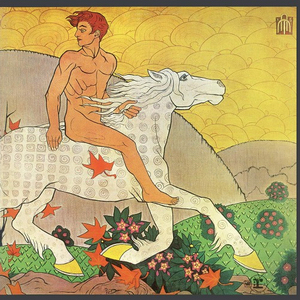
Then Play On is the third studio album by the British blues rock band Fleetwood Mac, released on 19 September 1969. It was the first of their original albums to feature Danny Kirwan and the last with Peter Green. Jeremy Spencer did not feature on the album apart from "a couple of piano things". The album offered a broader stylistic range than the straightforward electric blues of the group's first two albums, displaying elements of folk rock, hard rock, art rock and psychedelia. The album reached No. 6 on the UK Albums Chart, becoming the band's fourth Top 20 LP in a row, as well as their third album to reach the Top 10. The album's title, Then Play On, is taken from the opening line of William Shakespeare's play Twelfth Night—"If music be the food of love, play on".

"Albatross" is a guitar-based instrumental by Fleetwood Mac, released as a single in November 1968, later featuring on the compilation albums The Pious Bird of Good Omen (UK) and English Rose (US). The piece was composed by Peter Green.

Daniel David Kirwan was a British musician whose greatest success came with his role as guitarist, singer and songwriter with the blues rock band Fleetwood Mac between 1968 and 1972. He released three albums as a solo artist from 1975 to 1979, recorded albums with Otis Spann, Chris Youlden, and Tramp, and worked with his former Fleetwood Mac colleagues Jeremy Spencer and Christine McVie on some of their solo projects. As a member of Fleetwood Mac, he was inducted into the Rock and Roll Hall of Fame in 1998.

Future Games is the fifth studio album by British-American rock band Fleetwood Mac, released on 3 September 1971. It was recorded in the summer of 1971 at Advision Studios in London and was the first album to feature Christine McVie as a full member. This album was also the first of five albums to feature American guitarist Bob Welch. "He was totally different background – R&B, sort of jazzy. He brought his personality," Mick Fleetwood said of Welch in a 1995 BBC interview. "He was a member of Fleetwood Mac before we'd even played a note."

Robert Joseph Weston was a British rock guitarist, who was a member of Fleetwood Mac in the early 1970s. He also recorded and performed with a number of other musicians, including Graham Bond, Long John Baldry, Murray Head, Sandy Denny, and Danny Kirwan.

Penguin is the seventh studio album by British-American rock band Fleetwood Mac, released in March 1973. It was the first Fleetwood Mac album after the departure of Danny Kirwan, the first to feature Bob Weston and the only one to feature Dave Walker.

Hello There Big Boy! is an album by British blues rock musician Danny Kirwan, who was a member of Fleetwood Mac from 1968–72. Released in 1979 on the DJM Records label, this was his last solo album. It was eventually released on CD in February 2006, albeit only in Japan.

The Vaudeville Years of Fleetwood Mac 1968 to 1970 is an album by British blues rock band Fleetwood Mac, released in 1998. It was a compilation of outtakes and unreleased tracks from the band's early line up, none of which had previously been officially released. Available on double vinyl LP and double CD, it came with a booklet of extensive notes and anecdotes, and was the companion volume to Show-Biz Blues: Fleetwood Mac 1968–70, which was released a few years later.
"Stop Messin' Round" is a song first recorded by English blues rock group Fleetwood Mac in 1968. It was written by the group's principal guitarist and singer Peter Green, with an additional credit for manager C.G. Adams. The song is an upbeat 12-bar blues shuffle and is representative of the group's early repertoire of conventional electric blues. The lyrics deal with the common blues theme of the unfaithful lover and share elements with earlier songs.

Shrine '69 is a live album by British blues rock band Fleetwood Mac, recorded on 25 January 1969, and finally released in 1999. Recorded at a concert in Los Angeles, this album includes versions of the band's recent hits, "Albatross" and "Need Your Love So Bad", as well as more unusual songs like "Before the Beginning" and "Lemon Squeezer".

"Man of the World" is a song recorded by Fleetwood Mac in 1969, and composed by vocalist and lead guitarist Peter Green. After the group signed to Immediate Records that year, the label collapsed shortly after the single's release. As such, "Man of the World" is the only Fleetwood Mac single under the Immediate Records label.
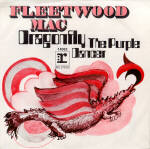
"Dragonfly" is a song written by British rock musician Danny Kirwan with lyrics taken from a poem by Welsh poet W. H. Davies. It was originally recorded by Kirwan's band Fleetwood Mac in 1970, and became the first UK single released by the band after the departure of their frontman Peter Green. It was also their first single with Christine McVie as a full member of the group. By the time the song had been released, guitarist Jeremy Spencer had left the band.
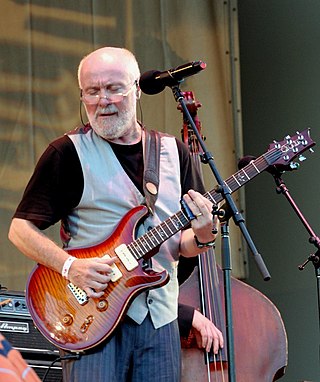
Jeremy Cedric Spencer is a British musician, best known for playing slide guitar and piano in the original line-up of the rock band Fleetwood Mac. A member since Fleetwood Mac's inception in July 1967, he remained with the band until his abrupt departure in February 1971, when he joined the "Children of God", a new religious movement now known as "The Family International", with which he is still affiliated. After a pair of solo albums in the 1970s, he continued to tour as a musician, but did not release another album until 2006. He released further solo albums from 2012 onwards and has also recorded as part of the folk trio Steetley. As a member of Fleetwood Mac, he was inducted into the Rock and Roll Hall of Fame in 1998.
"Rattlesnake Shake" is a song by British rock group Fleetwood Mac, written by guitarist Peter Green, which first appeared on the band's 1969 album Then Play On. The track was considered the high point of its parent album, and was one of the band's crowd-favorites in the late 1960s.















